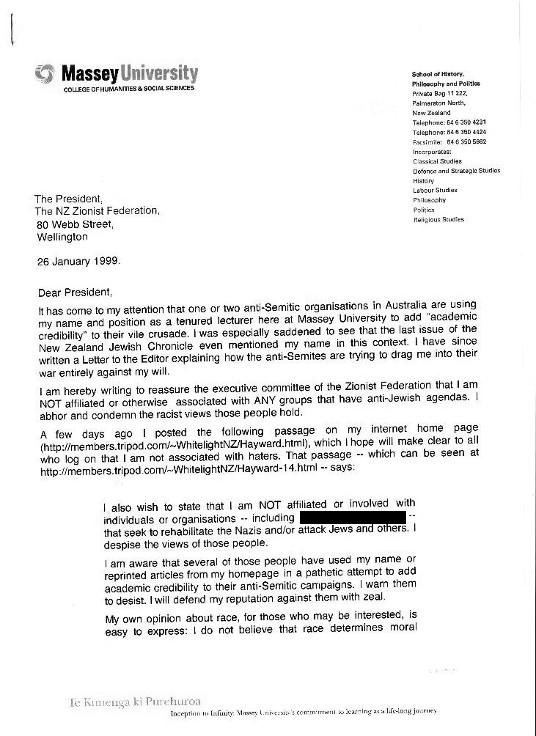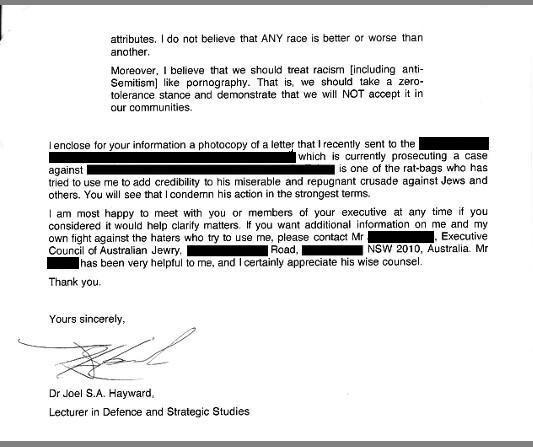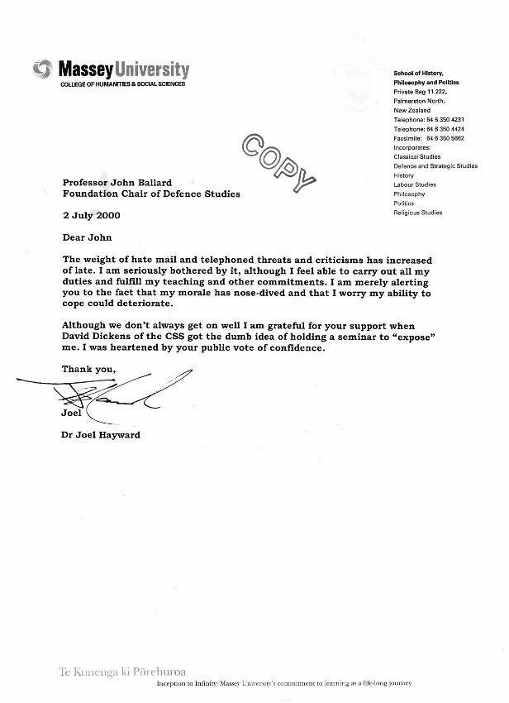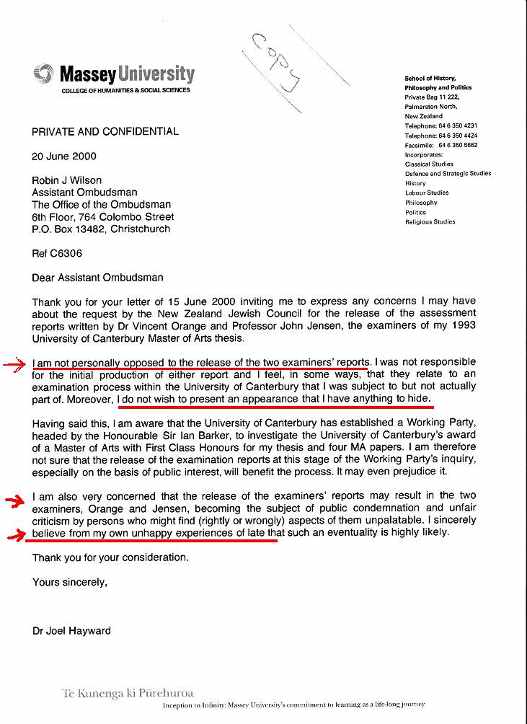Prof. Joel Hayward’s website archive
Joel Hayward, ZDaF, BA, MA Hons, PhD, FRSA, FRHistS
My overview of ‘The Affair’, continued
Dr Joel Hayward’s Explanation (continued)
Click HERE to return to the previous section!
[cntd] …
I did not re-ignite the public interest this year (2003) in my story. In May, Canterbury University’s History Department did, by destroying 500 copies of a published article on me. I had not even known about the writing of that article prior to its short-lived publication
This year media attention on the controversy, and on my life since 2000 (and especially since my departure from university employment in 2002), has been very intense, and I have sometimes found the glare of the spotlight unpleasant. Yet that does not mean that all media coverage has been negative towards me.
Indeed, many print, radio and television journalists and editors have "covered" me and my circumstances with fairness, accuracy and sensitivity.
It is my hope that, now both sides of the story have been told, the fair-minded New Zealand public will make up its own mind as to whether I am the architect of my own misfortune or the victim of narrow-minded hostility and maltreatment stirred up by the complainants, whose public condemnations of me continued into 2001.
I continue to feel regret at three things: errors in my thesis; some people's anger at those errors; and the misuse of the thesis by certain racists and politically motivated cranks.
But that does not mean I must forever remain quiet while people abuse me, violate my rights, or use me as a pawn in a game in which the players in both teams have their own aggressive agendas.
Let me make my position clear:
I now accept that I was inadequately prepared to undertake such an ambitious and complicated thesis in 1991, but the History Department did accept my "very carefully worked out thesis proposal," and provided a supervisor who expressed no concerns. [4.]
I do not think the general topic was inappropriate; only that I attempted to investigate far too much within the confines of a single-year, half-masters thesis.
I recognise flaws and errors in the thesis, some significant, that I did not see at the time of writing.
My heightened awareness of those flaws and errors is the result of subsequent reading and reflection.
I still strongly regret those flaws and errors, but after having supervised many theses myself and researched numerous others, I consider some of those flaws and mistakes typical, qualitatively and quantitatively, of those found in almost all masters theses that receive successful (that is, passing) grades.
I accept, however, that others of my mistakes were so big that they should have jumped out at my supervisor (not that I place any blame on him). I also accept that my topic was unusually controversial and that external scrutiny, some of it microscopic by experts and others working for the complainants, has heightened the publicly perceived importance of the flaws and errors within my thesis.
I have thus publicly apologised many times in all sincerity to the particular community which expressed outrage at the flaws and errors.
I firmly stand by all my statements in the Addendum, dated 26 January 2000, that I attached to the thesis. Click to read the Addendum.
Yet that does not mean I will remain passive while protagonists on either side of the revisionist/anti-revisionist debate attempt to use me or my 1991 thesis as ammunition to fire at each other.
I have the right to defend myself, and I shall, against any of the diminishing number of people who still insist I was or am a heretic; that is, a "Holocaust denier" or a "secret" supporter of "Holocaust deniers".
My vigour in defending my reputation and family name during recent months this year (2003) does not mean that I no longer feel regret or have revised any of the views that I expressed in the Thesis Addendum. It is merely indicative of my realisation that my sincere apologies almost always fell on deaf ears.
During 2000 I twice sought arbitration with the New Zealand Jewish Council:
- the first time via a request for the Working Party to facilitate such arbitration or mediation, which I made in person on 25 July 2000 to Sir Ian Barker, the Chairman of the Canterbury Working Party (and a nationally known arbitrator) and in writing to Sir Ian and the working Party on 25 September 2000.
- the second time by way of a direct request to Professor Graeme Fraser, the Assistant Vice Chancellor (Academic) of Massey University for him to facilitate such arbitration or mediation through Massey's Dispute Resolution Centre.
My requests were declined.
Those were not my first attempts to meet with and reassure the New Zealand Jewish community. On 26 January 1999, for instance, I wrote a conciliatory letter to the New Zealand Zionist Federation, addressed to its President. In that letter I stated categorically: "I am NOT affiliated or otherwise associated with ANY groups that have anti-Jewish agendas. I abhor and condemn the racist views those people hold." I gave the Zionist Federation a photocopy of a letter that I had sent to a human rights tribunal. In that letter I refused permission for a particular Holocaust revisionist to present my thesis as evidence in his defence. I also advised the New Zealand Zionist Federation that "I am most happy to meet with you or members of your executive at any time if you considered it would help clarify matters." Here is my copy of my letter [with certain names blacked because of New Zealand's tough privacy and libel laws]:


Unfortunately I received no reply from the New Zealand Zionist Federation.
Moreover I have this year (2003) again sought mediation with the New Zealand Jewish Council, and even recently spoke three times (for 17 minutes from 9.40 a.m. on 30 July; for 9 minutes at 2.41 p.m. on 9 August; and for 4 minutes from 11.10 a.m. on 15 August) by telephone to Mr David Zwartz, Council President, seeking to lay the controversy to rest in a "win-win" manner.

This is a printout from my telephone account. The Kelburn phone number (disguised for obvious reasons of confidentiality) is Mr Zwartz's. He and his confidants will naturally recognise the number.
My thrice expressed telephone request to Mr Zwartz unfortunately resulted in silence and no conciliatory meetings. Despite the very pleasant Mr Zwartz expressing to me a desire for a meeting, he clearly was unable to convince his fellow Council members. I wonder if the person who most strongly opposed meeting me is the same person who has schemed to keep the whole affair on the front-burner. If so, perhaps the Jewish Council might reflect on whether its handling of all these matters wouldn't have been managed better without the mischief of one uncompromising, unreasonable person.
I feel disappointed by the Council's rebuff of my efforts at conciliation, and still extend my hand in friendship to this body that on some levels represents a community (the wider Kiwi Jewish community) that I respect.
Allegorically, I see my current situation like this: it would be reasonable and probably necessary to apologise sincerely for accidentally making someone trip and skin their knees. But it would not be reasonable for the person who caused the accident to keep apologising whilst or after the other person rose from the ground and began pounding him in the face.
I have for over three years been criticised by some in the media, and even worse abused by strangers in many ways, for unintentionally causing grave annoyance to some people.
The abuse took the form of very hostile phone calls, letters, emails and other communications, and sometimes involved threats against my life. On the worst occasion the threat was targeted at my children.[5.]
Some people, including friends to whom I showed the threats or hate mail, have wondered why I did not involve the Police. This is easy to explain. I DID consult the Police, but in an informal manner seeking advice, not in a formal manner seeking protection.
A former Massey University Defence Studies student of mine who is a Police Inspector advised me that, however distressing such hate was, violence threatened almost never became violence performed. That gave me some reassurance. He also advised me that ignoring idiots was better than giving them what they seek: publicity or a forum/soapbox for venting their spleens.
This was, I still believe, very sound advice.
In any event, all the threats and hate directed at me did far less damage psychologically than did my "trial" by the Working Party convened by Canterbury University.[6.]
By totally shattering all my beliefs about academic freedom the politically motivated (as I see it) Working Party scarred me in a way that hateful threats and accusations could never do.
As the only tenured New Zealand academic ever to be hauled before a tribunal at his alma mater for having allegedly committed grave academic dishonesty, my self-confidence as a scholar and teacher plummeted.
Being found not guilty of dishonesty should have been encouraging, but the Working Party's additional scathing criticisms of my fledgling research rendered that verdict worthless to me.
I adopted a passive response throughout the period of my worst difficulties (November 1999 — June 2002) in the hope it would reduce inflamed passions. It did not, and only broke my spirit and made me feel and behave like a victim.[7.]
It is not my plan to continue passively accepting hostility, accusations, or suspicions.
My publication record itself reveals that I am a most inappropriate target for such abuse. Since 1993 I have written a successful PhD dissertation, scores of peer-reviewed academic articles, and six books (some of which have been highly praised internationally and none of which has been panned).
Three of my books are used as set texts or recommended texts in university and staff college courses around the world.
In not one of the million words I've published have I repeated any so-called heresy.
The choice is thus obvious: either I'm not a heretic and never was, or I'm the world's most uncommitted and unsuccessful heretic.
— Joel Hayward
October 2003
[1.] Report by the Joel Hayward Working Party (University of Canterbury, December 2000), page 11.
[2.] D. Bing, "Pseudo-History: New Zealand's Denial Problem", The Review, July 2000.
[3.] Report by the Joel Hayward Working Party (University of Canterbury, December 2000), pages 2, 3, 62.
[4.] New Zealand Jewish Council Letter of Complaint Addressed to the Reverend Dame Phyllis Guthardt, Chancellor of the University of Canterbury, dated 4 April 2000, presented as Appendix A in Report by the Joel Hayward Working Party (University of Canterbury, December 2000).
[5.] That I have received telephone, email, verbal and written aggressive accusations or threats of violence is impossible to doubt.
I reported it in 1992 to Professor W. David McIntyre, the HoD, History at Canterbury. Professor McIntyre described this as "persecution" in a letter to Mr Alan Hayward, University Registrar, dated 25 May 1992.
The Working Party would later criticise "[T]he fact that Dr Hayward had been harassed," and especially the fact that in 1992 I had secretly been videotaped in conversation with supposed friends, who then sent a highly edited, maliciously selective version of the tape and transcripts to various people and agencies throughout New Zealand. The Working Party called this an "underhand and unjustifiable intrusion" into my privacy.
Still distressed by all these actions four years later, I advised Mr R. W. Hlavac, Canterbury University Librarian, in a letter dated 21 October 1996, that now the library embargo on my thesis had expired (without any attempt by me to prevent that) I was still concerned about the "verbal abuse, threats, etc" that I had suffered. I nonetheless instructed Mr Hlavac that I would merely rely on the library's "usual practice" (Mr Hlavac's words, letter to Joel Hayward, 17 October 1999) of referring anyone requesting to study my thesis to seek my permission as author. (Note: I never denied ANY requester access to the thesis!)
Then, when abuse and hate mail became more frequent during 1999, 2000 and 2001, I explained to my successive line managers, Professor John R. Ballard, Professor Peter A. Schouls and then Professor David Thomson that this correspondence was causing me great distress. I shared some of the vile "correspondence" with the latter, who kept it on file for some time.
I have kept photocopies of some of my correspondence with line-managers, including:

Most of the garbage I received was unimaginative and only semi-literate, and phrases like "hope you die," "you'll get yours," "die scum!," "rot in hell," and "we'll be waiting for you outside your work" seemed so common that, had the calls and mail not come from different parts of New Zealand or been sent from many different email addresses, I probably would have concluded that they came from one small group of hate-filled people.
Some of this mail even came from a senior academic at another New Zealand university, and, with full specifics, I reported that academic's behaviour and mail to the Working Party. I felt so distressed by some of the mail that, in a letter to the Head of the Working Party, Sir Ian Barker, dated 1 August 2000, I pointed out my concerns. Sir Ian told me during our interview on 10 October that he shared my grave concerns.
I also felt extremely worried that my old supervisor would also fall victim to the actions of haters, but, perhaps because the Working Party made me the prime focus of its investigation and the media seized on me as the architect of the whole mess, Dr Orange experienced little hatred. I thank God for that.

Because of offensive calls Telecom has had to change our number almost every year. In the last three years, for example, I believe our home number has been, successively, 06-3537002, 06-3540583, 06-35400823, and now 06 3540XXX.
Thankfully, since leaving Massey University the degree of hate directed at me has diminished considerably. After I left Massey (with whom I have no unresolved issues) I kept a lot of the vile mail and so forth in a box in our hallway closet. My wife Kathy persuaded me that, because it felt like a cancerous presence in our home, we should get rid of it. She was right; binning that poisonous material was quite a healing experience.
[6.] and [7.] Click on the link at the bottom of this page to read about my continuing health problems.
[All documents mentioned here are found in Report by the Joel Hayward Working Party (University of Canterbury, 2000) or in my personal files on this affair.]
— Dr Joel Hayward
(ZDaF, BA, MA Hons, PhD)
4 September 2003
UPDATE: 13 September 2003: I never cease to be amazed by the irrationality of some people. This morning I received a phone call from a journalist with a national tabloid newspaper, who advised me that a middle-aged Massey undergraduate student had contacted him, admitting that he had given me the live bullet I showed on TV3's 60 Minutes. Yet he claims he gave it to me [in mid-2002?] not as a threat, but as a "gift."
I informed the journalist that I cannot understand this man's motives (was he scared I would report him to the Police?), and that at the time I certainly did not consider it a gift. On the contrary, I found it a highly intimidating action, especially as the giving of the live bullet was NOT accompanied by any friendly message!
I have never owned a gun, I do not own a gun, I do not have a firearms license, I do not go shooting, I do not even fire any weapons at targets [oh, aside from "that" time in Alabama], I have not told anyone I go shooting or that I'd like to, I have never killed an animal [aside from fish], I do not collect weapons, etc. So some "gift," eh!
Nonetheless, in keeping with my belief that "talking things through is better than fighting them out," I will employ a mediator, and through his or her services, attempt to communicate with this "gift"-giver to see if there has not been some grave misunderstanding, or, if a hatred exists, to see whether that can't be dealt with through discussion and explanation.
UPDATE: 15 September 2003: I have this morning asked a distinguished New Zealander (a former army general) to facilitate a meeting between the bullet-giver and me to see if this horrible difference can be resolved in the way that all conflicts should be: through discussion.
UPDATE: 23 September 2003: I learned today from Major General Piers Reid, DLitt, that the guy who gave me the bullet refuses to meet with me in a mediated context. I expected as much.
Click HERE or on the navigation links on the left of the page
to read the famous suppressed HISTORY NOW article.
Dr Joel Hayward is a New Zealand scholar, writer and poet. Dr Joel Hayward is also a world recognised military historian. Although some people know Dr Joel Hayward’s name because of a masters thesis on Holocaust revisionism that he wrote at Canterbury University in Christchurch over a decade ago Dr Joel Hayward is not a Holocaust revisionist and does not support Holocaust revisionism. Dr Joel Hayward lives in Palmerston North in New Zealand.
